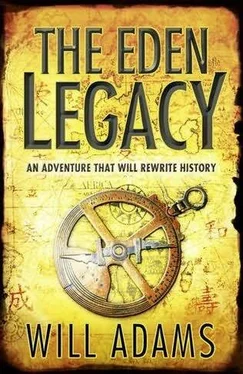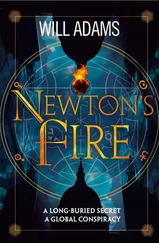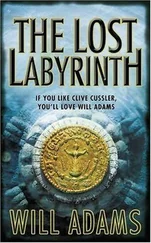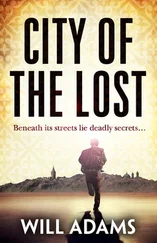Will Adams - The Eden Legacy
Здесь есть возможность читать онлайн «Will Adams - The Eden Legacy» — ознакомительный отрывок электронной книги совершенно бесплатно, а после прочтения отрывка купить полную версию. В некоторых случаях можно слушать аудио, скачать через торрент в формате fb2 и присутствует краткое содержание. Жанр: Триллер, на английском языке. Описание произведения, (предисловие) а так же отзывы посетителей доступны на портале библиотеки ЛибКат.
- Название:The Eden Legacy
- Автор:
- Жанр:
- Год:неизвестен
- ISBN:нет данных
- Рейтинг книги:5 / 5. Голосов: 1
-
Избранное:Добавить в избранное
- Отзывы:
-
Ваша оценка:
- 100
- 1
- 2
- 3
- 4
- 5
The Eden Legacy: краткое содержание, описание и аннотация
Предлагаем к чтению аннотацию, описание, краткое содержание или предисловие (зависит от того, что написал сам автор книги «The Eden Legacy»). Если вы не нашли необходимую информацию о книге — напишите в комментариях, мы постараемся отыскать её.
The Eden Legacy — читать онлайн ознакомительный отрывок
Ниже представлен текст книги, разбитый по страницам. Система сохранения места последней прочитанной страницы, позволяет с удобством читать онлайн бесплатно книгу «The Eden Legacy», без необходимости каждый раз заново искать на чём Вы остановились. Поставьте закладку, и сможете в любой момент перейти на страницу, на которой закончили чтение.
Интервал:
Закладка:
‘Are you threatening me?’
‘Me? No. I give information, travel information. And is not just jail you must think about. If we know Mustafa collects money, bad peoples know also. Greedy peoples. They think maybe this their chance to make themselves rich. When Mustafa gives you money, they-’
‘I’ve had enough of this.’
‘-they come for you,’ insisted Andriama. ‘Guns, knives. They cut your throat, here to here, for money like this.’
Rebecca rose to her feet. ‘How dare you talk to me this way!’
‘Because I want to help you,’ said Andriama. ‘Tell me what happen and I do everything I can. What chance have you, alone?’ He leaned forward, tapped the tabletop. ‘Listen-these kidnappers watch what you do. Already they see you talk with me today. They think now for sure we work together.’ He spread his hands to show her the obviousness of what he was saying. ‘You have nothing to lose.’
‘Jesus!’ exclaimed Rebecca. She walked unsteadily away, hands on her head. What a mess this was becoming! She consulted her watch. Nine fifty, still no sign of Mustafa or the kidnappers. Andriama was finishing his pastry, watching her closely. She hurried for her Jeep, her nerves jangling. A stone had got into her right shoe and now pressed against her heel. She tried to pick it out but lost balance, had to put her hand against the wall.
A phone began to ring nearby. Rebecca looked around. Some Madagascans eked out a tenuous living renting out their mobiles. One such man was sitting at a school-desk on the pavement, fanning himself with an old newspaper. He had no chin at all, as though a team of crack surgeons had cut out his jawbone and stitched his Adams apple directly back to his lower lip. Rebecca watched with a sense of premonition as he answered his phone, listened for a few moments, then held it out to her. ‘C’est pour vous,’ he said.
THIRTY-FOUR
I
Knox had too much to do to spend the morning in the boathouse basement, but he was still in something of a daze as he went back up the steps, locked the steel door then hid it again behind its plasterboard facade.
First things first: he was anything but an authority on Chimu ceramics. He certainly couldn’t make a determination of so small and damaged a fragment with any confidence. And even if it was Chimu, it didn’t mean it had come from the same wreck as the Chinese ceramics. It could theoretically have come from some other wreck, or even just have been brought here by a collector, and then been lost.
But the chances of that…
Knox had occasionally come across the Chimu while working as an Egyptologist. The Early Chimu-better known as the Moche-had been pyramid builders too, and so once or twice he’d been asked about the possibility of cultural crossover. On such occasions, he’d usually smiled politely and pointed out that the Early Chimu had built their pyramids well over a thousand years after the Egyptians. More to the point, they’d lived in Peru.
It was one thing to imagine a Chinese ship sailing west from the Cape to within sight of South America, then turning back. It was another altogether to have them heading south down the east coast and then reaching the Pacific through the Straits of Magellan a hundred years before Magellan did. Yet that was what this fragment implied.
The Chimu of the black ceramics were a much later people than their pyramid-building forebears. They’d first come to notice in the early tenth century, but it had only been in the fourteenth that they’d become a major regional power. They’d worshipped the moon and the sea, had sacrificed their own children. When Francisco Pizarro and the Spaniards had sailed south from Panama on their voyage of discovery to Peru, it had been off the port city of Tumbez that they’d first anchored; and though the Chimu had themselves recently been absorbed into the Inca Empire, Tumbez had still been in essence a Chimu city.
A colleague of Pizarro’s called Pedro de Cieza de Leon had written a vivid account of that first contact. It had always struck Knox as curious. Dozens of men had paddled balsa-wood rafts out to Pizarro’s ship, bringing fresh fruit, fish and llama meat to trade. Once on board, they’d exclaimed excitedly over the crowing of a rooster, the beards of the Spanish men, the blackness of the slaves. That is to say, it hadn’t been this great foreign ship in itself that had so amazed them, but the detail of it. Pizarro was the first European to venture so far south; and though Magellan and his fleet had already passed Tierra del Fuego on their circumnavigation, they’d left the coast behind far further south. Maybe word had already reached the Chimu about these strange people from across the seas, but, if so, they’d been impressively relaxed about it, for the Spanish had taken death and disease and the brutal pursuit of gold with them wherever they’d gone. So maybe, just maybe, other strange visitors had arrived in great ships before. Visitors without beards or black skins.
Knox was an archaeologist. He enjoyed a good speculation as much as the next man, but he liked evidence he could see and touch before taking it seriously. Aside from the Norse settlement at L’Anse aux Meadows, there were just a few bare scraps of evidence of pre-Columbian contact with the New World. A Roman-style terracotta head had been discovered in the foundations of a pre-Columbian Mexican house. Carved Olmec heads appeared to reflect African features; a Malinese fleet was known to have sailed westwards across the Atlantic; and Columbus himself had been told by the natives of Hispaniola of previous visitors with black skins. There was evidence from the plant kingdom too. The sweet potato, an American endemic, had spread across Polynesia long before Columbus. The resin in Peruvian mummifications came from New Guinea trees. African gourds had been found in Central America, and there were claims of cocaine and tobacco in ancient Egyptian contexts. American peppers had been described by Aristotle’s pupil Theophrastus, and there was a pineapple in a Pompeii mosaic. Chicken bones carbon-dated to the fourteenth or fifteenth century had been found on the Chilean coast, far to the south of Tumbez, even though chickens were supposedly introduced by Europeans. But, when all was said and done, it was a fairly meagre catalogue of evidence, especially as every scrap of it could be explained away by natural causes, fraud or coincidence. Extraordinary theories needed extraordinary proof, after all.
And maybe he’d just found it.
II
Rebecca took a moment to calm herself before she took the phone. ‘This is Rebecca Kirkpatrick,’ she said.
‘You have the money?’ A man’s voice, but the signal was too weak and the crackle too loud for her to tell much more than that.
‘Yes,’ she lied. ‘Yes I do.’
‘You have one hour. There is-’
‘I want to speak to my father.’
‘You have one hour. There is a sheet-’
‘I speak to my father or you get nothing,’ she yelled. She ended the call and stood there clutching the phone in trembling hands, waiting for it to ring again, praying for it to ring. The phone’s owner reached tentatively to take it from her. She held up a palm to fend him off. They’d call back. For five hundred million ariary, they’d call back. If they didn’t call, it meant they didn’t have Adam and Emilia, it had all been a sham. She’d go straight to Andriama and tell The phone jumped suddenly in her hand. She almost spilled it. ‘Do that again,’ said the man, when she answered, ‘and we kill them both. You understand?’
‘I want to speak with-’
Another man’s voice came on. ‘Rebecca,’ he said. ‘Rebecca, my darling.’
The sound of his voice transfixed her. She’d have recognised it anywhere. ‘Dad!’ she wailed. ‘Dad.’
Читать дальшеИнтервал:
Закладка:
Похожие книги на «The Eden Legacy»
Представляем Вашему вниманию похожие книги на «The Eden Legacy» списком для выбора. Мы отобрали схожую по названию и смыслу литературу в надежде предоставить читателям больше вариантов отыскать новые, интересные, ещё непрочитанные произведения.
Обсуждение, отзывы о книге «The Eden Legacy» и просто собственные мнения читателей. Оставьте ваши комментарии, напишите, что Вы думаете о произведении, его смысле или главных героях. Укажите что конкретно понравилось, а что нет, и почему Вы так считаете.












